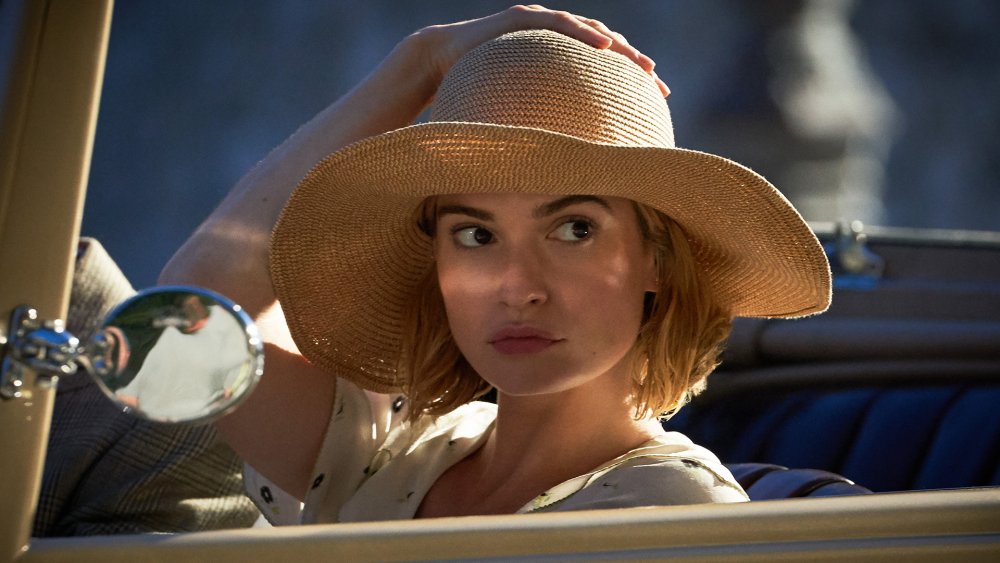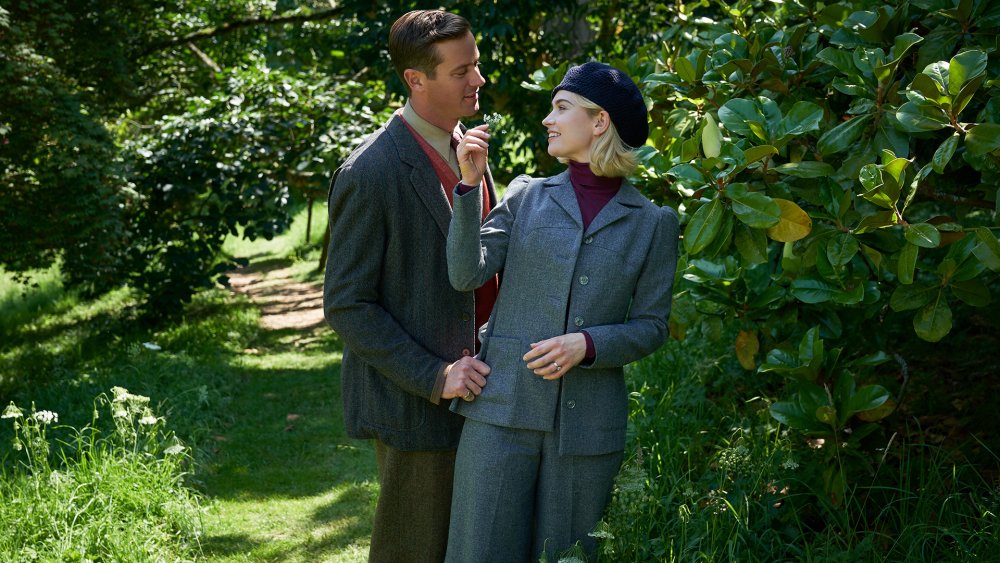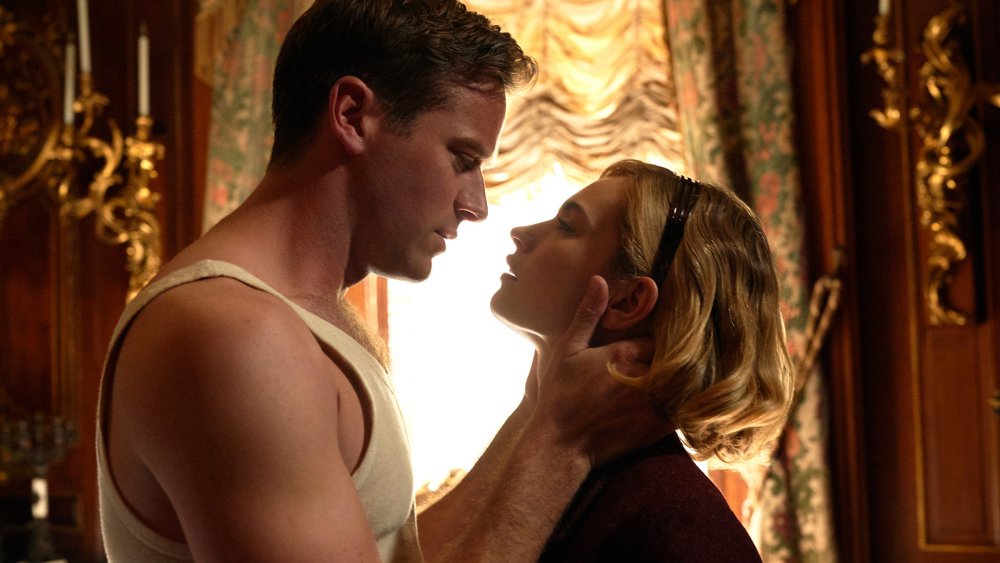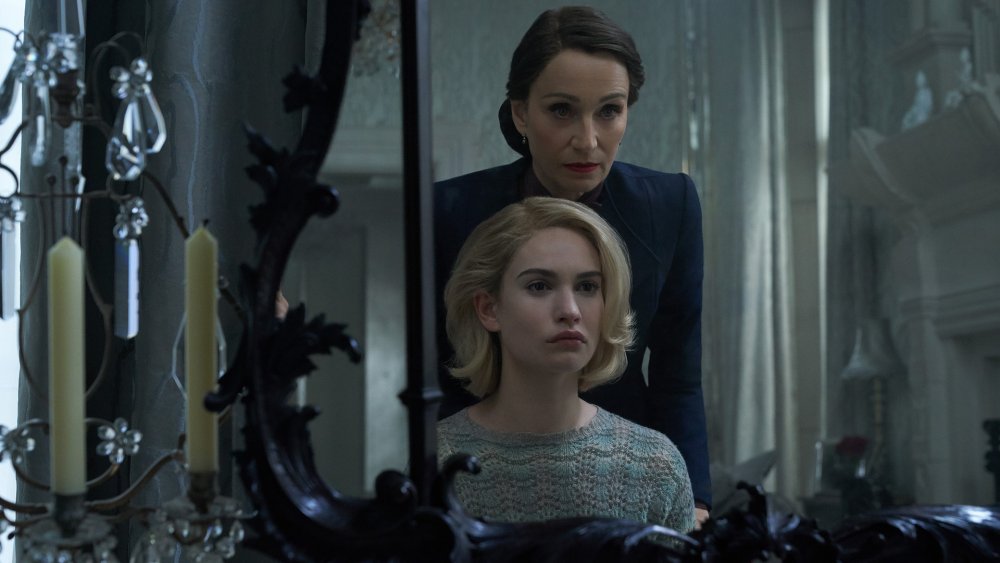Read This Before You See Rebecca
This content was paid for by Netflix and created by Looper.
A young, working-class bride suddenly vaulted into the upper class after a whirlwind romance and an impromptu marriage. A handsome aristocrat who's still haunted by the tragic death of his first wife. A sinister housekeeper who remains slavishly devoted to her former master, and the gorgeous but cold estate where they all live, which remains haunted by the memory of its previous occupant. What could possibly go wrong?
As the legions of fans of Daphne du Maurier's novel Rebecca know, plenty. Over the past 80 years, Rebecca has both delighted and horrified millions of readers around the globe. It's easy to see why. While du Maurier's gothic thriller might be well on its way to its 100th birthday, it's still a suspenseful and harrowing read, and its depiction of bullying, gaslighting, and psychological abuse remain all too relevant in the modern era.
As with many popular books, Rebecca has been adapted for the silver screen, for television, and for the stage numerous times, yet whether you're a newcomer to the story or whether you've seen them all, you've never seen Rebecca quite like this. As brought to life by director Ben Wheatley, the latest take on du Maurier's classic novel is a moody and stylish thriller that's full of color, top-tier actors, intrigue, and at least one major twist. It's a fresh take on a timeless tale, and may just be the best rendition of Rebecca yet. Here's why.
The story behind one of the most popular novels of all time
In 1932, young Daphne du Maurier met Frederick "Boy" Browning, a decorated officer in the British Army who tracked her down because he loved her books. They quickly fell in love, and got married after a scant 10-week relationship (as the story goes, du Maurier was the one who proposed). However, a few years into their marriage, du Maurier made a shocking discovery: she wasn't Browning's first love. As she learned from letters that her husband had saved, the soldier had previously been engaged to a beautiful socialite named Jan Ricardo. While that wedding never happened, du Maurier was consumed by jealousy all the same, and began to suspect that her husband had never really gotten over his first bride-to-be.
And so the seeds of Rebecca were planted, although they wouldn't come to fruition for a few more years, after du Maurier signed a lucrative publishing deal and spent a year struggling to write. Eventually, however, du Maurier began to tell the story, locking herself away for four months while she worked on what would become her biggest hit. By 1938, the work was done, and du Maurier released Rebecca to the world.
It was an immediate hit, selling double the estimated number of copies at launch, and it hasn't been out of print since. Even today, more than 80 years after its initial publication, Rebecca sells thousands of copies a month. In 2017, voters named Rebecca the UK's all-time most favorite book in a poll conducted by W H Smith, in which it beat out the likes of To Kill a Mockingbird, Pride and Prejudice, Rebecca's spiritual predecessor Jane Eyre, and others. In 2019, the BBC named it one of the "most inspiring" novels ever. It's an undisputed classic, and one of the most popular books ever written. And yet in this case, the source material is only the beginning...
Two big names not likely to be overshadowed
In many ways, the early part of Mrs. de Winter's story is like a fairytale: she's a lower-class girl who's swept off her feet by a handsome and wealthy stranger, and turns into a member of the aristocracy overnight. It's only when they return to de Winter's palatial estate that things begin to take a turn, and Rebecca's memory begins to affect the new relationship.
So naturally, Lily James is the perfect person to play her. After a recurring part on the have-and-have-nots drama Downton Abbey, James catapulted into the spotlight as a literal fairy tale princess in Cinderella. From there, she's gone on to star in everything from Pride and Prejudice and Zombies to Baby Driver to Yesterday and Mamma Mia! Here We Go Again. In other words, James has both the range needed to play such a complex character and experience with period pieces, thrillers, domestic dramas, and more. She couldn't be a better fit.
Still, Rebecca only works if Mr. de Winter is worth all of the trouble. That's what Armie Hammer is here for. Since his award-winning breakout performance as the Winklevoss twins in The Social Network, Hammer has become one of Hollywood's most eclectic leading men. He's had roles in big, lavish blockbusters like The Man from U.N.C.L.E. and The Lone Ranger. His turn as a romantic lead in the indie drama Call Me By Your Name resulted in a whole slew of awards nominations. He's already played a charismatic, abusive villain in Boots Riley's Sorry to Bother You, and he's even worked with Rebecca's director, Ben Wheatley, before. In 2016, they collaborated on the action-comedy Free Fire.
Rebecca's friends, family, and foes make for a tangled web of intrigue
The final piece of the puzzle is Mrs. Danvers, the de Winter's cruel housekeeper who reveres the late Rebecca and can't stand her boss' new wife, and who doesn't waste a single opportunity to let the poor young woman know. She's one of literature's most memorable villains, which is why it's a good thing that an actor of Kristin Scott Thomas' caliber has agreed to play her. From Four Weddings and a Funeral to The English Patient to her critically-acclaimed and award-winning theater work, Thomas has been bringing audiences to tears for decades. We have no doubt that she'll be able to turn up the savagery and make the new Mrs. de Winter cry, too.
Rebecca also stars Tom Goodman-Hill, who you know from British TV shows like Ideal and the original version of the Office, as Frank Crawley, one of Mrs. de Winter's few allies. Keeley Hawes, a veteran who's received a number of BAFTA nominations for her TV work, as well as plenty of attention for her role on Ashes to Ashes, plays Beatrice Lacy, Mr. de Winter's socialite sister. On the Road and Maleficent star Sam Riley appears as Rebecca's cousin Jack Favell, and they're all joined by Emmy-winning The Leftovers and The Handmaid's Tale star Ann Dowd, Mrs. de Winter's former employer.
That's a pretty incredible cast, but then again, Rebecca is a pretty incredible story. Thankfully, all of these folks have already proved themselves more than capable. You can trust them to do du Maurier's story right.
A master of psychological tension
In terms of genre, Rebecca walks a fine line. It has moments that are terrifying, but it's not really a horror movie. The plot hinges on questions regarding marriage and true love, but it's not exactly a romance. It takes place in the past, but calling it a historical drama is a bit of a stretch. A thriller, a melodrama, a mystery — nothing seems to quite fit.
That's because ultimately, Rebecca is a combination of all of those things, and it requires a director who can deftly blend together a variety of tones while still preserving the tension that keeps the story moving forward. Thankfully, Ben Wheatley is just that type of filmmaker. While Wheatley has tackled a number of different genres — his 2012 film Sightseers is a horror-comedy, 2015's High-Rise is a near-future dystopian chiller, and 2018's Happy New Year, Colin Burstead is a comedic drama — his movies all have a couple of things in common: One, they all have a satirical edge. Two, they lay the thrills on thick.
Both of those elements should come into play during Rebecca. As a psychological thriller, Rebecca is a best-in-class effort. As a commentary on class, social norms, and marital conventions, du Maurier's novel is deceptively sly and insightful. With Wheatley at the helm — directing from a script by Jane Goldman, who previously wrote Kick-Ass and Kingsmen — the new adaptation of Rebecca should be the same.




